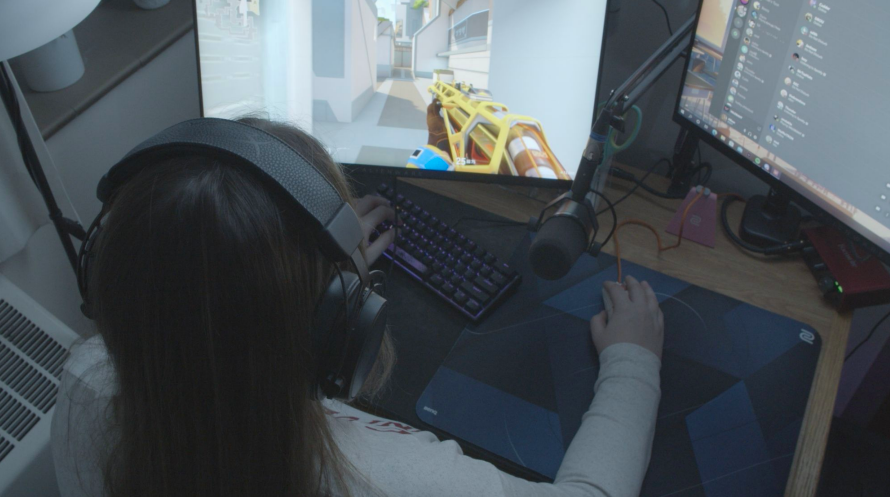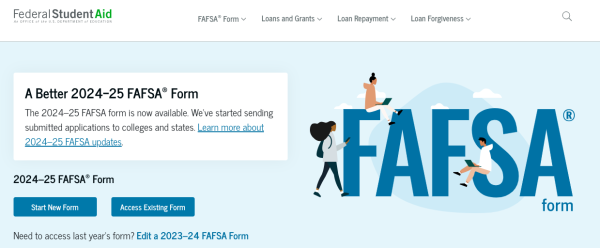Just like any other sport, but virtual: Calvin Esports is now a club sport
Freshman Allison Drouillard, who captains Calvin Esports’ Valorant team, practices her craft.
During the pandemic, then-sophomore Trace Rutman found himself playing a lot of video games in quarantine.
“I was like, ‘Why not make this a campus-wide thing?’” Rutman said. So he founded an esports student organization, hoping to “connect people who [were] trapped in their rooms.”
This student organization still exists, and it offers a more relaxed way for students to participate in esports. But for those who want to compete at a higher level, there’s a brand new option: Calvin Esports, a fully-fledged club sport complete with scheduled practices and competitive video game tournaments. The university has invested significant resources into Calvin Esports, which will soon offer team members a dedicated space in which to compete.
In Nov. 2022, Jason Faasse started as Calvin University’s first ever director of club sports, a position which oversees activities like esports, rugby and ultimate frisbee alike. In this role, Faasse aims to “bring those competitive sports closer to the athletic department.” In the same month, Rutman was hired on a part-time basis as the head coach of Calvin Esports. The pair has been working hard to build Calvin Esports from the ground up.
Both Faasse and Rutman are adamant that esports is –– as its name suggests –– truly a sport. “All of the same concepts as athletics are involved,” Faasse told Chimes. “There’s a stamina: a mental stamina.”
“Of course, it’s not nearly as physical as [other] sports. [But] every sport demands a different skill set, and just like every other sport, we have a team. We practice together,” Rutman said. Calvin Esports players practice six hours per week with their teams, and most put in several more hours of their own time. “It requires a ton of communication, a ton of teamwork.”
This semester, Calvin Esports has about 15 members and comprises two teams, which play two different games: Valorant and League of Legends. It’s their first semester competing as a club sport, Rutman said, and both teams are on a winning streak. As of last week, the League of Legends team was 2-0, while the Valorant team was 4-1. The two teams compete each week against schools across the country: Last week, they played Indiana University and Saint Louis University.
“Calvin Esports is focusing on being a very high-commitment atmosphere,” Rutman said. He envisions uniforms and traveling –– all the hallmarks of a sports team.
But first, Rutman and Faasse are working to create Calvin’s first esports-dedicated space, known as an esports lab, where team members can gather. By the end of the semester, the lab will have a set location and 6 stations, with an ultimate goal of 16 stations in the lab.
Until then, team members will continue to practice and compete in their own separate spaces.
“The term ‘practice’ is kind of weird when you’re not going somewhere. When it’s from your own dorm, it’s easy to get distracted,” said freshman Allison Drouillard, who serves as the captain of Calvin Esports’ Valorant team. “When we get that space, it’s going to motivate everyone to really show up and start working. That sense of community will be a lot stronger.”
Esports’ “approachability,” Rutman said, is one of its biggest strengths. “Esports is co-ed: Some of our best players are women. It’s also very welcoming to people with different disabilities who may not be able to compete in a physical sport,” he said.
Drouillard said that she feels “welcomed” in Calvin Esports, although the team she captains is currently “very male-dominated.” “If any girls are reading the paper and they want to join –– join, because we need more girls!” she said.
According to Rutman, building an esports program at Calvin will give the institution an important advantage in recruitment.
“Esports teams are popping up across the country,” Rutman said. “For Calvin, as a smaller liberal arts school, to corner that market is going to be super important.”
“Schools around us have esports labs,” said Faasse, citing Ferris State University as one example. “Bringing that into the mix here at Calvin is going to capture kids that want to go here.”
But it’s the combination of esports opportunities and the Calvin culture that will prove to be most powerful, according to Faasse. He noted that in the future, Calvin Esports might include a service component, like mentoring a high school esports team.
“I think [students] come here for the whole student experience,” said Faasse. “We can do esports and remain all things Calvin.”








